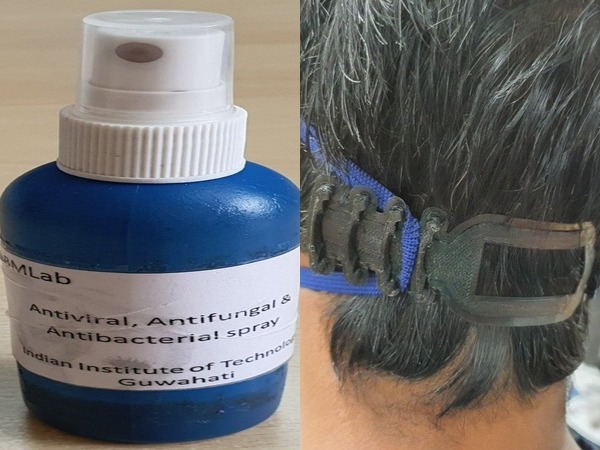IIT Guwahati researchers develop affordable antiviral spray-based coating for PPE
In an attempt to safeguard healthcare workers and citizens from coronavirus, a team of researchers at Indian Institute of Technology (IIT), Guwahati have developed an affordable antimicrobial spray-based coating for PPE kits to kill and prevent the spread of microbes once they come in contact with the coated PPE surface.

- Country:
- India
In an attempt to safeguard healthcare workers and citizens from coronavirus, a team of researchers at Indian Institute of Technology (IIT), Guwahati have developed an affordable antimicrobial spray-based coating for PPE kits to kill and prevent the spread of microbes once they come in contact with the coated PPE surface. They have also developed 3D printed ear guard for the comfortable use of face masks by healthcare workers, said IIT Guwahati in a statement.
In a press release, IIT Guwahati said that the concepts were developed by Dr Biman B. Mandal, Professor, Department of Biosciences and Bioengineering, IIT Guwahati, along with his Ph.D. scholars, Bibhas K. Bhunia and Ashutosh Bandyopadhyay. Talking about the work, Dr. Biman B. Mandal, Professor, Department of Biosciences and Bioengineering, IIT Guwahati, said, "Effective yet affordable technologies are need of the hour for India. We at IIT-G under the leadership of our Director, Prof. T.G. Sitharam, are committed to contribute to the nation's immediate need at this hour of COVID-19 crisis."
PPEs that are being used presently are designed to protect the wearer from infectious microbes/aqueous virus droplets acting as a barrier. However, these PPE, generally, do not have the ability to prevent the spread of microbes as the surface of the fabric readily allows adherence and accumulation of microbes with time. This leads to further spread of the microbes due to the negligent handling of PPE and wrong disposal protocols, said IIT Guwahati.
The strategic association of metal nanoparticle cocktail, such as copper, silver and other active ingredients, present in the spray acts as an antimicrobial agent. This ensures limited penetration and accumulation of microbial contaminants on PPE. Thus, the coating has the potential to reduce the risk of secondary infection by limiting the transmission of the microbes.
(This story has not been edited by Devdiscourse staff and is auto-generated from a syndicated feed.)
- READ MORE ON:
- IIT Guwahati
- Guwahati
- Indian Institute of Technology
- India
- PhD
ALSO READ
PM pays tribute to martyrs of Assam Agitation at 'Swahid Smarak Kshetra' in Guwahati.
Development of Assam, Northeast was never part of the Congress agenda: PM at rally in Guwahati.
Centre taking strict steps to stop infiltration: PM tells rally in Assam's Guwahati.
Guwahati Airport: A Nature-Inspired Aviation Hub Inaugurated by PM Modi
Nature-Inspired Terminal at Guwahati Airport: A Fusion of Tradition and Innovation










